Appendix 1
Submission No. 1 - Community and Public Sector Union
CPSU SUBMISSION TO COMMUNITY AFFAIRS LEGISLATION COMMITTEE
Health Insurance Commission (Reform and Separation of
Functions) Bill 1997
Introduction
On 10 April 1997 the Government announced its decision to
separate Medibank Private functions from the Health Insurance Commission. The
Government made its decision in response to the Productivity Commission's
inquiry into the private health insurance industry. The Productivity
Commission's report to the Government referred to complaints from the private
health insurance industry that co-location of Medibank Private operations with
Medicare operations gave an unfair competitive advantage to Medibank Private.
CPSU contends that the Government has bowed unnecessarily to these complaints
based on an incorrect assertion that separation of Medibank Private from the
HIC will somehow restore 'competitive neutrality'.
This paper will show that separating Medibank Private operations
from the Health Insurance Commission is unjustified, will be highly disruptive
to staff employed in the Health Insurance Commission and will lead potentially
to cost increases.
Competitive neutrality
Medibank's efficiency
The Productivity Commission's inquiry into the private
health insurance industry found that the Health Insurance Commission (a
Commonwealth statutory authority) is Australia's largest health insurer with
the lowest management costs. The Australian Medical Association submitted to
the inquiry that the Health Insurance Commission had the lowest cost of
processing claims due to its use of information technology.
The Productivity Commission recognised that the HIC had
access to significant economies of scale due its size and its market presence
in every state and territory. Medibank's branch office network, advertising
campaigns, contracts with health service providers and computer facilities are
examples cited in the report of economies of scale available to large funds
like Medibank private.
Medibank's efficiency and productivity
is derived from its size and economies of scale, not from any competitive
advantage from its association with Medicare.
Cost apportionment
The Health Insurance Commission Act 1973 requires the
Minister for Health to determine financial principles to apply to cost
apportionment between Medibank Private and non-Medibank operations. Under the
Act and the Minister's principles, the Health Insurance Commission must
nominate each cost centre as being either Government programs or Medibank
Private. Joint cost centres must be broken down into either branches,
processing centres or overheads. The number of respective computer transactions
for Medibank and Medicare is used as a simple and equitable yardstick to
determine cost apportionment.
It has been clear for some time that the cost apportionment arrangements
operating on Medibank Private is fair. The Minister's cost apportionment
principles have been determined in consultation with Treasury and have been
found to be acceptable to the Commonwealth Auditor-General. Furthermore, the
Joint Committee of Public Accounts (JCPA) conducted an inquiry into cost
apportionment in 1992 and found "while the cost apportionment system may
not allow accuracy at the lowest level of the proportions of costs charged to
each function, it does meet the requirements of predictability, administrative
simplicity and equity in the distribution of total costs between Medicare and Medibank
Private". Further, the JCPA found no evidence "that cross
subsidisation occurs of Medibank Private and Medicare".
The strict cost
apportionment guidelines with the Health Insurance Commission ensure that Medibank
Private does not enjoy a competitive advantage from its association with
Medicare.
Staff Issues
Mobility rights - sections 18 and 21
Section 21(2) of the Bill gives the Minister power to
forcibly transfer staff from the Health Insurance Commission to Medibank
Private Limited.
"(2) The Minister may,
by written instrument, declare that a specified employee:
- ceases to be employed by
the Commission at a specified time (the employee's transfer time); and
- is taken to have been
engaged by the nominated company as an employee of the nominated company at the
employee's transfer time."
This means that the power could be exercised against
the expressed wishes of a staff member. The Health Insurance Commission has
advised CPSU that in order for some conditions of employment to follow
employees into Medibank Private, the Minister must have the power to transfer
employees to Medibank Private Ltd. HIC wrote to CPSU on 7 July 1997 stating
"We have received legal advice indicating that the protection of mobility
rights hinges on the compulsory transfer of staff from HIC to Medibank private.
As far as I am aware, there are no other rights/benefits protected by the
compulsory nature of the provisions."
If this is true, in order to counter-balance the Minister's
unfettered power, HIC employees must be given the right to freely transfer
between the Health Insurance Commission and Medibank Private. The Minister's
power can be delegated to either HIC management and/or Medibank Private Ltd.
management (section 34).
Many of our members in the HIC have been employed there for
several years. Staff turnover is not high. Therefore members employed by HIC
have careers built on a mixture of Medicare and Medibank Private work.
Section 28(2) of the Bill refers to the Minister's power to re-transfer
staff from Medibank Private Ltd. back to HIC. CPSU supports such a process but
we have two major concerns with application of this particular power.
28(2) The
Minister may, by written instrument, declare that a specified employee:
- ceases to
be employed by the nominated company at a specified time (the employee's
re-transfer time); and
- is taken
to have been engaged by the Commission as an employee of the Commission at the
employee's re-transfer time.
Firstly, the Bill states that there is a 12 months time
limit on re-transfer opportunities. After the expiry of 12 months from the date
of separation of Medibank from HIC, an employee will no longer have the
opportunity to transfer back to HIC (or from HIC to Medibank). This period is
too short in duration and should be extended to a three year period. A three
year period reflects the 'standard' in the Australian Public Service where
employees transferred from the Service to a statutory authority have up to
three years to revert back to their original employment in the Australian
Public Service. The APS entitlement is contained in the Public Service Act
1922.
Secondly, the ability to re-transfer is also predicated on
the agreement of the Minister or his/her delegate. An employee should have a
re-transfer right to counter-balance the Minister's power to forcibly
transfer in the first instance. An employee should have the right to elect to
re-transfer back to HIC where they are not satisfied with the original decision
to transfer to Medibank Private Ltd.
The separation of HIC staff
into Medibank and non-Medibank employment will be highly disruptive and lead to
unwarranted effects on staff careers unless there is a genuine choice for staff
whether to stay with HIC or transfer to Medibank Private Ltd.
Separation of assets and staff - sections 17-19
Medibank Private is the owner of many of buildings occupied
by HIC. Medibank Private also owns the extensive computer hardware and computer
centre in Canberra which the Medicare Program must use to process the billions
of Medicare claims lodged annually. In discussions with the Health Insurance
Commission, CPSU has learned that HIC proposes to 'contract' many operations
and administrative arrangements between HIC and Medibank.
For example, HIC cannot afford to purchase a new Medicare
computer centre so it will have to lease Medibank Private's computer operations
at a price. Similarly, shared corporate operations such as finance and
personnel will have to be contracted from HIC to Medibank Private. Once Medibank
Private establishes itself, these contractual arrangements may cease thereby
leaving HIC with potentially redundant staff. These are added reasons why the
transfer period should be extended to three years.
Separation of Medibank
Private will lead to complicated contractual arrangements and could lead to
adverse effects on staff performing contractual work for the other organisation.
Privatisation - section 35(2)
CPSU views the decision to separate Medibank Private from
the Health Insurance Commission as the likely first step in the ultimate
privatisation of Medibank Private. It is comforting to acknowledge that section
22A of the Bill specifically denies the Government the option of divesting
itself from ownership of Medibank Private. CPSU strongly supports the on-going
ownership by the Commonwealth of its private health insurance operations.
35(2) The
Commonwealth must not transfer any of its shares in the nominated company.
It is not uncommon for state-owned organisations to undergo
excessive staff reductions as a precursor to complete privatisation.
Privatisation would create job insecurity amongst our members employed in Medibank
Private.
Secondly, privatisation of Medibank Private would be at odds
with the reasons for establishing Medibank Private in the first place. Medibank
Private has acted as a brake on excessive price increases in the private health
insurance market and it has been a recognised pace setter in terms of
innovative health insurance products. Privatisation of Medibank would likely
give the private insurers greater ability to impose price increases at a time
when prices are already rising steeply for other reasons.
If there is little
justification for the upheaval associated with separating Medibank Private,
then CPSU wonders whether the real intention is to set up Medibank Private for
privatisation.
Effects on Medicare
Separation of Medibank Private operations from the HIC
creates two individual organisations with greater risk of exposure to exterior
threats. Together, Medicare and Medibank offer a more diversified range of
operations and therefore greater opportunities to survive if one of its
component parts is threatened or attacked. HIC employees are offered greater
job security where their employer has a more diversified range of operations
than an employer with a more limited focus of operations.
Separation will weaken the
combined strength of Medibank Private and the Health Insurance Commission and
this will adversely affect the job security of both groups of staff.
Submission No. 2 - Australian Health Insurance Association
AHIA Comments to
the Senate Community Affairs Legislation Committee on Health Insurance
Commission (Reform and Separation of Functions) Bill 1997
- AHIA welcomes the much needed division of the Health Insurance
Commission into two sensible entities: the trading operation of Medibank
Private and the Government program operations of Medicare, the PBS and other
Government functions. Since the introduction of Medicare, the integration of a
trading arm with a government social program has led to a number of internal
and financial anomalies, the most important of which has been the marketplace advantage
given to Medibank Private by virtue of its capacity to share costs and
resources with Medicare: or, to put it another way, to enjoy at least in
potential terms a working subsidy from the taxpayer.
- The separation of the commercial entity from the Government program
function is a welcome step towards restoring genuine competition between a Government
owned registered benefits organisation and non-Government operators. Such
competition will only be genuine, of course, if the financial advantages Medibank
Private has accrued over the years are removed. It is not clear to AHIA
precisely how these advantages are to be adjusted, but is certainly our view
that a truly competitive situation demands that they are. Over the years the
advantages conferred on Medibank Private have included:
- failure
by Government to claim interest on funds advanced for establishment costs - in
effect providing Medibank Private with a commercial advantage unavailable to
all organisations with which it was competing.
- a
capacity to reduce or conceal administration costs below industry norms by
virtue of sharing costs with taxpayer funded activities.
- the
existence of a captive tenant arrangement which allowed the Commission to
invest in property which is funded by the taxpayer.
- the
guarantee of a captive client and guaranteed throughput as claimants on
Medicare have been required to use Medibank Private offices, etc.
- a
capacity to share staff and office resources in co-located shopfronts, further
reducing administration costs.
- Ministerial approval to transfer reserve moneys between States to
maintain solvency levels in the early years of the introduction of Medicare.
This effectively allowed individual Medibank Private funds in different States
to undercut their competition without breaching viability requirements,
although Funds operated in each State were expected to operate on a
free-standing basis for reserve purposes.
- Although the Commission has traditionally claimed that the assets
attributed to Medibank Private were acquired from profits which the Fund itself
generated AHIA argues the contrary: that the nature of the Medibank Private
accounts has made it impossible to determine whether assets acquired could
genuinely be attributed to MP. Certainly the knowledge that Medicare would be
required to rent, or meet its share of rental costs, in properties built for or
acquired by the Commission in the name of Medibank Private allowed the HIC to
invest with much greater confidence than other insurers. Over the years the HIC
accounts have consistently shown that most assets which yield income are held
in the name of Medibank Private.
- AHIA asserts that joint operation has allowed Medibank Private over the
years to have generated surpluses which, in real terms, may not exist if they
are based on a false allocation of salary and other costs to Medicare.
Certainly they do not reflect the surpluses that would have been generated had Medibank
Private’s accounts been handled on a free-standing basis rather than a complex
cost sharing formula determined by the Minister of the day.
- The benefits of cost sharing are very simply illustrated by comparing Medibank
Private’s pre-Medicare situation with that after Medicare’s introduction: In
1982-83 (pre-Medicare) Medibank Private paid audit fees of $142,000; in 1992-93
its audit fees were $10,000 less, though the Commission’s total audit cost was
much greater. Similarly Medibank Private’s payments to Commissioners (the
Board) dropped from $75,389 in 1982-83 to $23,050 in 1992-93. This should not
be seen as the Board taking a pay cut: Medicare more than filled the gap.
- Since 1992-93 the HIC accounts fail to specify the amounts allocated
between functions, but AHIA has no reason to believe the above advantages have
not continued.
- The following
tables show the cost shifting of audit fees from Medibank Private and Medicare
(and other Government programs) and the shift in payments to Commissioners from
MP to taxpayers since 1982-83 (the year before Medicare's introduction). Since
1992-93 the Commission has not provided a breakdown of these costs between
functions, but under the cost shifting formula AHIA believes the same or very
similar relativities would apply.
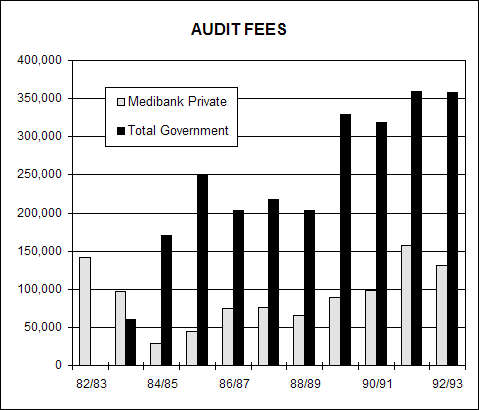
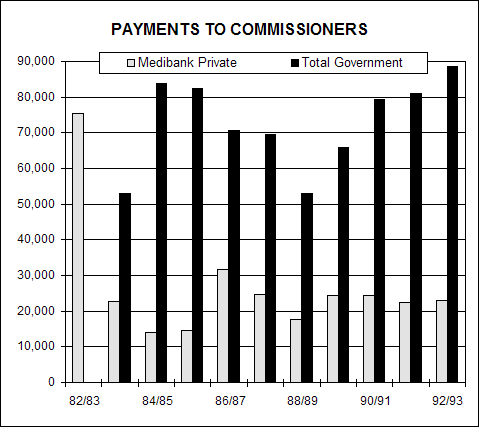
SALARIES
- The HIC total
salary bill in 1994-95 was $161.9 million. Total HIC staff was 4,955 - an
average salary of $32,688 per employee. Medibank Private was charged $13.1
million for staff (which equates to 400 employees), and approximately $20.3
million of apportioned salaries which equates to an additional 620 employees
working for the function; i.e. the Commission attributes a total of 1,020
staff to the Medibank Private payroll. A survey of AHIA members indicates an
industry average staff ratio of one employee per 790 single equivalent units (SEUs).
Medibank Private has 1,124,348 SEUs. Applying the industry average, Medibank
private would actually require 1,420 staff or 400 (39%) more than the cost
allocation formula suggests. Using the average salary per employee
($32,668), Medibank Private should have paid an additional $13 million in
salaries in 1994/95.
- The cost
allocation formula has been of considerable benefit to Medibank Private since
the introduction of Medicare: for the first six years of joint operation Medibank
Private's salary costs were lower than in 1982-83. Even allowing for some reduction
in staff levels directly attributable to private health insurance as a direct
result of Medicare's introduction Medibank Private has obviously benefited
considerably from cost shifting to Medicare.
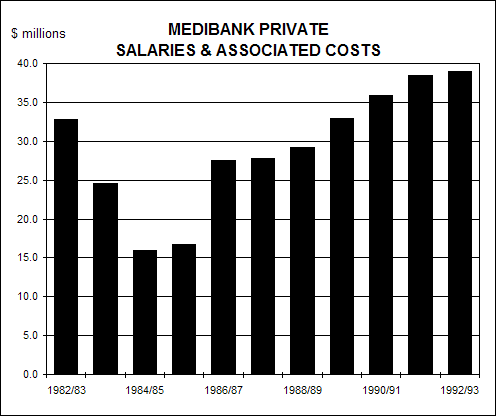
- Had Medibank
Private's salaries increased at CPI from 1982-83 it would have paid $293 million more in salaries.
OCCUPANCY
- In 1982-83 (the
year before Medicare was introduced) Medibank Private owned 22 out of 194
branches including head offices around Australia. These were bought either from the original
Government grant or trading activities. However Medibank Private appears to
have enjoyed a windfall benefit from Medicare activity due to the cost
apportionment formula which allows it to act as "landlord" and
Medicare as "tenant", perhaps even in premises bought with Medicare
money.
- Occupancy as
defined under management expenses refers to rental charges on land and
buildings. In 1994/95 Government Programs paid approximately $34 million
dollars in Occupancy costs - Medibank Private paid approximately $7.9 million. If
all land and buildings were classified as belonging to the Government, or Medibank
private paid for all occupancy costs, then Medibank Private would have paid an additional
$34 million in 1994/95. (Approximations - for 1993/94 and 1994/95 the
apportioned costs of management expenses allocated to each function were not
broken down by item, so the ratios by item that were available in 1992/93 have
been applied to 1994/95)
- Medicare's
occupancy costs have risen significantly over the period, as shown by the graph
below. The increase has overall been a direct cash benefit to Medibank Private.
If all land and buildings had been classified as belonging to Medicare, or Medibank
Private paid for all occupancy costs, then Medibank private would have paid an
additional $228 million since the introduction of Medicare.
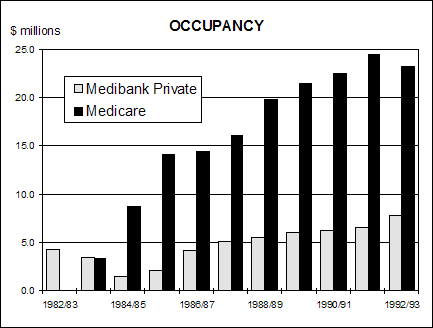
ASSET
UTILISATION
- Asset Utilisation Charges are
defined as asset rental charges for assets other than land and buildings. In
1994/95 Government Programs paid approximately $14 million dollars in Asset
Utilisation Charges - Medibank Private paid approximately $3 million. If all
other assets other than land and buildings were classified as belonging to
Medicare, or Medibank private paid for all other asset utilisation costs, then Medibank
Private would have paid an additional $14 million in 1994/95. (Approximations
- for 1993/94 and 1994/95 the apportioned costs of management expenses
allocated to each function were not broken down by item, so the ratios by item
that were available in 1992/93 have been applied to 1994/95)
- If all assets other than land
and buildings were classified as belonging to Medicare, then Medibank Private
would have paid an additional $73 million since the introduction of Medicare.
- The following table shows the
variation in asset utilisation charges between the two functions.
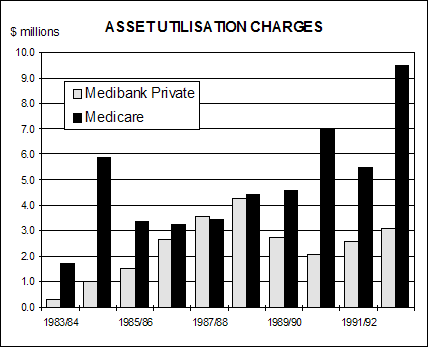
PROPERTY, PLANT
& EQUIPMENT
- The allocation of property,
plant and equipment to Medibank Private has grown considerably since conjoint
operation with Medicare. Since 1982-83 property, plant and equipment has
increased by $85 million - from $46 million to $130 million - an increase of
186 %. Given the nature of the HIC apportionment it is not possible to
determine what property was, in fact, bought from profits generated by health
insurance trading activities.
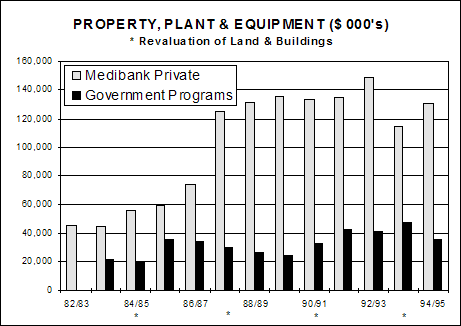
SENIOR STAFF REMUNERATION
- This item was first reported
in 1990-91, but from 1992-93 the split has not been outlined in the annual
reports. One assumes the relativities continue. Given that Medicare is
basically a Government program it is difficult to see why such a large number
of senior executive time should be provided to Medicare administration rather
than the marketplace activities of a very active "private" health
insurance operation.
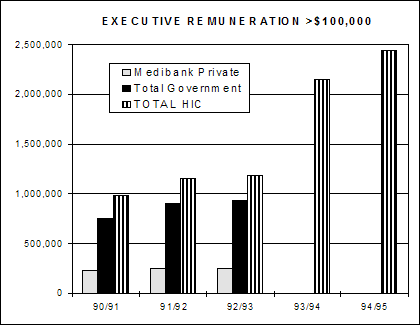
Retail Activity
- AHIA has already indicated its concern about “one stop shopping” in
joint Medicare/ Medibank Private offices. The legislation should make it clear
that this activity will cease on fund transfer day if not before.
The New Health
Insurance Commission
- AHIA welcomes the new role of the HIC as an information agency. Given
the interest of the health insurance industry generally in relation to
information related to health sector initiatives AHIA is concerned that the Bill
appears to require consultation only with State and territory governments in
respect of possible representation on the Board of the HIC. Now that the
trading arm - Medibank Private - has been separated from the HIC, the industry
and the Commission would both benefit from a representative of the health
insurance industry being appointed to the Board, and AHIA would hope the
legislation is either amended or the Government prepared to give an undertaking
to ensure this occurs.
R J Schneider
Chief
Executive
Australian Health Insurance Association
Navigation: Previous Page | Contents | Next Page